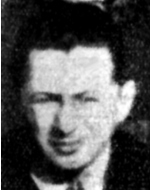Avraham, son of Rachel-Leah and Jacob, was born in 1927 in the city of Kosice in Czechoslovakia (now in southeastern Slovakia), his parents were shopkeepers, received Jewish and general education, studied in the room and continued to study in the yeshiva. The first world, after the dissolution of the Austro-Hungarian Empire, included the most industrialized areas of the kingdom, and before the Second World War, Czechoslovakia was disbanded in the Munich Agreement, and Kosice was included in the part of the country annexed to Hungary. The anti-Jewish laws enacted in Hungary, similar to the Nuremberg Laws, were taken from the summer of 1939 Jews were sent to the Hungarian Labor Service, but despite the recruitment of men, the number of Jews in Kosice increased, thanks to the arrival of refugees from Poland and Slovakia.The Germans entered the city in early 1944. In April a ghetto was set up and about 12,000 Jews were concentrated in two brick factories on the outskirts of the city. Auschwitz began in May 1944. Some 8,000 Jews of Kosice were murdered by gas as soon as they arrived in Auschwitz, and Avraham and his family were among those sent to the death camp. After the defeat of the Germans, Avraham came to a DP camp in Germany, where he underwent training in the Irgun, and wanted to immigrate to Israel in order to reunite with his relatives who had immigrated early, “Two days after the UN resolution on November 29, 1947, he wrote:” Simcha holiday! Today is the beginning of December, and we too received the great news, and today we greet each other on Simcha Holidays. The joy is hard to describe … At five o’clock in the afternoon we passed through the streets of the city with torches and flags as we sang. The Germans looked at us and thought about the time when they, too, were singing in the streets of the city on a Germany devoid of Jews, and suddenly the Jews could sing too. The German military police accompanied us in jeeps and guarded us so that nothing would happen. In Germany, the War of Independence was already underway, and he was preparing to continue his activities in the Irgun. And to fight for the country in which he so believed. He spent a short time with his relatives in Herzliya, where he joined the Givati Brigade, the 5th Brigade, where the Irgun fighters were assigned after the establishment of the State of Israel. Tel Aviv), which was established during 1946. The soldiers of the battalion defended the southern borders of Tel Aviv, as well as escorting convoys to the Negev and securing the water line to the south. Later on, they also fought on the Jerusalem front and became pioneers of the camp that arrested the Egyptian invader at his gallop to Tel Aviv. Avraham fought in Ashdod and in the southern region and it was right to go out for every action. In July 1948, he participated in a battle in the Ibdis compound, north of Kibbutz Negba, a battle considered exemplary battle in the defense of the Negev. Ibdis was an Arab village adjacent to an important Egyptian area. On the night of 8/9/1948, Givati forces conquered and established the outpost of Ibdis from the Egyptians. In the following days the Egyptians carried out repeated attacks in order to regain control of the outpost, but were repulsed. The Egyptians devoted many forces to battle, including heavy artillery, armored force and even aircraft. The difficult battle continued until July 12, 1948, during which more than twenty Givati fighters fell, but the area of Ibdis remained in the hands of the Israeli side, a fact that greatly aided the defense of Kibbutz NegevAnd to protect the entire Negev. On the 10th of Tammuz 5708 (10.7.1948) Abraham fell in battle for the protection of the Ibdis compound, and was brought to rest in the military cemetery in Be’er Tuvia. From the literary-artistic estate of the fallen sons, two letters were published by Abraham from Germany to his relatives in Israel, and the name of Avraham was written in the Torah scroll in memory of the heroes of the War of Independence who were placed in the synagogue on Mount Zion in Jerusalem. (Parents, brothers, sisters, sons and daughters), who had personally experienced the Holocaust in the ghettos and / or the concentration and death camps And / or on the run and hiding in territories occupied by the Nazis and / or fighting alongside members of the underground movements or partisans in the Nazi-occupied territories who immigrated to Israel during or after World War II, wore uniforms and fell in the Israeli army.
